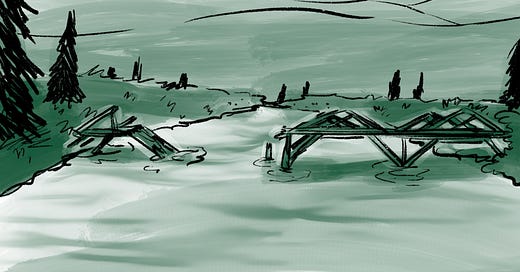In the Substack post Could Have, Should Have, Would Have I discussed the idea that losing a loved one before their time can feel like your future has been lost. The idea of a particular future does seem very real to us all. We invest in it and visualise ourselves living there. We project forward and make real concrete plans to invest in this future world.
This contrasts with the narrative we project onto our past lives, where we will often review and focus on key moments being pivotal in creating our present and leading to a future. This can only be done retrospectively. For example, if I had never sat at a particular desk in an office in my mid-twenties I would never have met my wife. Does this mean if I had sat somewhere else, we would have never met, or would we have both married someone else who sat next to us?
I do believe that a potential future has more validity than the stories we tell ourselves about the past. We do act like these potential futures are real. We invest our time, energy and resources into them. On a personal level we can invest in a career or profession in which we foresee success. We form romantic relationships and expect them to last a lifetime. Our ultimate future is based on having a family and nurturing children into adulthood. Many of us cannot contemplate a future that does not contain grandchildren.
All this potential—the career, spouse, family and grandchildren—is completely unrealised as we step into adulthood, but it feels as real as something in another room adjacent to our current life. To enter this potential world all we must do is step across, open the door and walk in.
The strange thing is we have a low grain definition vision of the future, but we know it will be full of purpose and contentment if it contains certain key elements. I think we can say we act out our lives like the potential future is real. Our actions are always far more important than our words when trying to define what is motivating and important to us.
I spent many years as a teacher in high schools. One of the most frustrating aspects of this job was witnessing young people squander their potential. They may have academic, sporting or creative abilities that place them above their peers. This ability seems to indicate a bright and exciting future for the child. Deviating from this potential future or, even worse, wasting these talents was lamented by teachers and parents alike. They probably angered me more than most other students because I knew they would regret it. How I thought I could possibly know all this I really cannot justify, because it is impossible to do so. That said, we all do it.
Consider a sports star or creative artist who displays immense potential but fails to capitalise on it. We feel a palpable disappointment. Sometimes the perceived waste of talent becomes legendary. In the UK, footballer George Best is often cited as an example of someone whose vices tragically curtailed one of the most promising football careers the world has seen.
George Best was quoted saying: "I spent a lot of money on booze, birds and fast cars. The rest I just squandered." At the time George did not feel he had wasted his potential, but the rest of society did.
This is why the loss of someone so young seems to affect everyone around them so profoundly. Not only do we miss the person, we miss the realisation of what they could have been. With any close family member you see your lives entwined with them. For a parent, this connection would last a lifetime; for a spouse or sibling, they will remain a significant part of most of your life. These people form part of your identity, they are part of your gang. Successes and failures will be shared. They make you feel special because they know they are special to you. Any sudden passing of these indivdiuals destroys eveyones potential future.
After losing my son, I often said I had writer's block when it came to the future, and I still think I do. Perhaps part of me is unable, unwilling, or both; to envision that potential future. It's a mix of finding it too painful to imagine a future without him and the visceral anger I feel at the destruction of his potential. We should never underestimate the fact that he would have been a good husband and father because he was a great son. The world needs decent people bringing up equally decent children. These individuals undoubtedly make the world a better place, as they are invariably responsible citizens, pleasant work colleagues, and welcoming to well-meaning strangers. These are the kinds of people who form the foundation of the best possible future we all envision.
For those who have lost their lives, the future has tragically vanished. This is a reality we must never forget. Those of us who are left must try to embody the promise and virtues of those who have gone. If we can do this, perhaps not all of their potential will be lost.






Thanking you for this insightful post